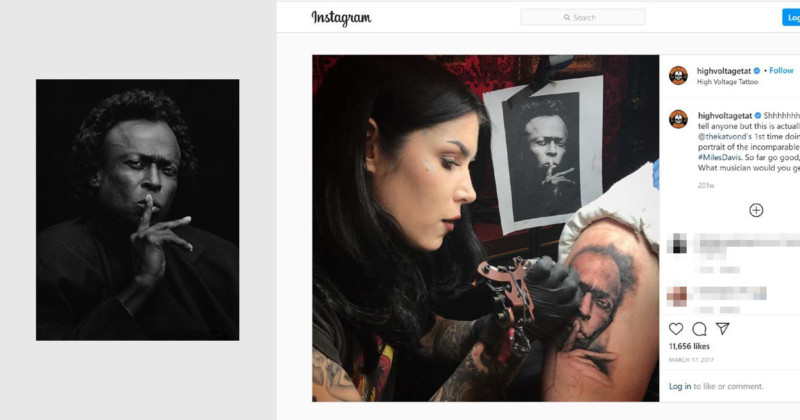US photographer, Jeff Sedlik, has ambitiously sued celebrity tattoo artist, Kat Von D, for copyright infringement after she tattooed his picture of jazz legend, Miles Davis, onto a client’s arm and posted it to social media.

Sedlik captured the Davis portrait in 1989 at the musician’s beach house in Malibu, California, and the picture was subsequently published in Jazziz and Life Magazine. A print is currently for sale at online art marketplace, Saatchi Art, for US$13,750, with the following description by Sedlik:
‘I prepared for this portrait session over a period of years, working through hundreds of concepts, creating dozens of sketches. Miles selected a number of my sketches, but this concept was his favorite. To make this photograph, I created a 20’x20′ tent of black cloth on the patio behind his home. The image was made at noon, in bright sun, beneath a large sailcloth. Miles treated me with respect, and I photographed him on many occasions in his later years.’
According to the lawsuit, Sedlik owns the copyright of the image and offers ‘non-exclusive copyright licenses authorising limited reproduction, distribution and display’ of the image.
Tattoo artist, Kat Von D, became famous after appearing in the noughties reality TV show, LA Ink, and has 7.4 million Instagram followers. She operates the High Voltage Tattoo parlour in West Hollywood, where she inked the Davis portrait on a client’s arm in early 2017.
Sedlik’s lawyers claim the tattoo artist didn’t ask to license the image and ‘unlawfully reproduced the Iconic Miles Davis Portrait by making multiple unauthorised reproductions and derivative works, ultimately fixed in the form of a tattoo on the arm of an individual’. The court papers cite Von D ‘unlawfully’ printing the image, placing that print on a light table and tracing ‘every detail’ in pencil, tattooing a copy of the Davis portrait on a client’s arm, and publishing promotional videos and social media images online showing the tattoo.
The lawsuit further alleges that publishing images online of the tattoo and the creative process constitutes commercial usage and further infringement, as the content promotes Von D’s brand.
It seems likely Von D’s lawyers will attempt to have the claim thrown out by arguing the alleged copyright infringement is Fair Use. This US exception to copyright infringement, which doesn’t exist in Australian copyright law, requires a defendant to meet a set of factors, including whether the defendant’s work is transformative from the original.
It will come down to a judges’ decision and the performance of both legal teams, but there is plenty of legal precedent leaning in favour of the tattoo artist. Of particular note are the court cases won by famous art appropriator Richard Prince, whose shtick is to steal photos, make slight adjustments, and sell them for obscene figures. The approach has made him both venerable and loathed in the arts world – depends on who you ask.
Sedlik’s lawsuit makes several mentions of the great lengths gone by Von D to make the tattoo appear as close to the original as possible. This is possibly a pre-emptive strike against the argument that Von D’s work is ‘transformative’ and therefore Fair Use. The problem is tattooing and photography are vastly different mediums.
Commercial lawyer, Jeremy Goldman, published a brief article in legal record publisher, Lexology, asking a number of questions about the case.
‘It’s an aggressive move by one artist against another and raises many interesting questions,’ he wrote. ‘Is it fair use? What are Sedlik’s damages? Is there an existing licensing market? Is the claim barred by the statute of limitations? Will the customer, who presumably requested (and is now wearing) the design, get pulled into the lawsuit by either party? Will the Miles Davis estate pile on with a right of publicity claim?’
Sedlik takes copyright infringement extremely seriously. He’s deactivated his online website portfolio due to ‘rampant copyright infringement’, and only supplies it at the request of a client. Read the court papers here.





Be First to Comment